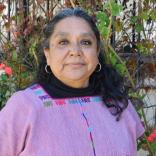
I was born the second daughter of a modest family in the Federal District, today Mexico City. I studied Social Work at the Vasco de Quiroga School in Comala, Colima.
In 1976 I arrived to Chiapas to the Diocese of San Cristobal de Las Casas, as part of a missionary congregation called Franciscan Eucharistic Missionaries, which I left towards the end of 1979. It was during this time that I began to build relationships with the Ch'ol Indigenous People in the northern regions of Chiapas. I assumed the responsibility of accompanying the communities and the catechists who had a clear vision of the need to organize themselves and to understand the socio-political situation. This time period was a time of a faith committed to history and political action rooted in the lives of people and communities efforts to address exploitation, submission, systemic poverty and marginalization.
I am a founder, alongside other women, of the Diocesan Coordination of Women (CODIMUJ), an initiative to link all the groups of indigenous and peasant women, to strengthen the voices of women, to create awareness of patriarchal relationships and violence against women, and to transform these systems and build spaces of freedom.
In 1996 I was part of the founding of the Commission for the Support of Unity and Community Reconciliation (CORECO). I am still a member of the Board of Directors of this non-governmental organization and act as a witness of the emergence of the consciousness of the people and their ability to be defenders of their rights, now in a clear position against transnational interests, committed to the defense of the territory.
In 1993 I was invited to work in DESMI, A.C. as an administrator, combining direct work in the communities and the work of administration of a non-governmental organization, after my extensive experience of accompanying the struggle of the people. From DESMI I committed myself to collaborate in the process of peace with justice and dignity. Since 1993, I have been part of the operational team of DESMI, serving as administrator, area manager and since 2012 I was appointed Coordinator and Legal representative. This position has left me with many lessons learned.
In 2014, I was nominated by IDEX (now Thousand Currents) to receive the Global Exchange Recognition of Human Rights Awards, which I received in May 2014 in San Francisco, California, for my life-work trajectory. Since 2015 I have participated with Thousand Currents in the Academy, to transform American philanthropy, consciousness, and the world.
At the invitation of the Fray Bartolomé de las Casas Human Rights Center, I was able to be a witness at the Permanent Peoples' Tribunal in the session of the Northern Zone of Tila, to denounce the violence carried out by counter-insurgency groups, para-military organizations such as the organization Peace and Justice, which operated in the municipalities of Tila and Sabanilla in the years 1995-1998. Various crimes committed by these paramilitary organizations remain in impunity and the communities maintain the memory of these events and demand justice and truth.
I believe that if I had not come across this process of the communities that was being woven, I don't know where I would be today. I have learned and I am what I am because I am in this land. I am the product of two processes, that of the diocese of San Cristobal and that of the organization of the Zapatista peoples. They are like two rivers that formed me and continue to form me. From the diocese the commitment, the spirituality, the strength that comes from the closeness to the people. From the Zapatista organization, the part of the political and organizational conscience, the rebelliousness, the commitment because we know that there is something that is being transformed, that what I do is an important part of that process.
The affection I have for the people with whom I work/relate is of greatest importance. They are beings who are in my head and in my heart. The commitment to this work comes from the spiritual strength of the people, from their resistance, that in spite of having the minimum, they give everything to build that other world we dream of and aspire to. DESMI has been the opportunity to continue doing this work, to accompany the journey of the autonomy of the peoples.


